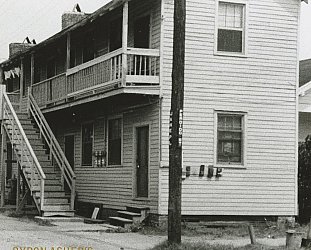Graham Reid | | 1 min read
Wild is Love

One of the finest, most entertaining, deeply moving and musically interesting concerts of jazz (and elsewhere) was by Cecile McLorin Salvant at the Auckland Town Hall in March, which we reviewed here.
As you may see, this remarkable and award-winning singer (French mother, Haitian father, raised in Miami) has a wonderful musical reach from deep old blues and chanson to swinging jazz, show tunes and the songs just to the left of the Great American Songbook.
Wrap that up with a bit of humour and some sexy swagger when appropriate (as well as the superb Aaron Diehl Trio) and this was a concert which people will talk about for years.
This new album – which follows her much recommended double Dreams and Daggers – dispenses with the trio in favour of just piano from Sullivan Fortner (organ in two places) and Melissa Aldana on tenor for the nine and half minute closer The Peacocks (lyrics written by Norma Winstone for the famous Jimmy Rowles tune, Aldana taking on this signature piece for Stan Getz).
Because some of her previous album was recorded live there was a vibrance and sometimes sauciness in her delivery. But these 17 pieces – although a few are taken from Village Vanguard performances – err more towards a serious and finely focused selection of songs by the likes of Stevie Wonder, Richard Rodgers (and with Hammerstein for the lighter The Gentleman is a Dope, with Hart on Everything I've Got Belongs To You), Sondheim-Bernstein's Somewhere and Cole Porter (the sophisticated but twee Were Thine That Special Face) and material from French cabaret (and her own composition in French).
So these songs are more serious in intent, but of course the freedom for singer and pianist in the duet setting allows them to stretch and bend melodies, get playful with the rhythms (check the two minute One Step Ahead where Fortner plays both piano and organ and they pack in a number of changes) and the seven minute Somewhere allows for a nod to another tune from from West Side Story to be woven into the impressionistic extemporisation by the pianist.
From the poised blues of Trouble is a Man to the ballad Tell Me Why and beyond, many of these songs explore love as an uncomfortable road or a sublime elevation into blissful happiness. And she has the expressiveness and range to carry all that off.
A more challenging – and serious – album than it's predecessor, but utterly engaging for very different reasons.





post a comment